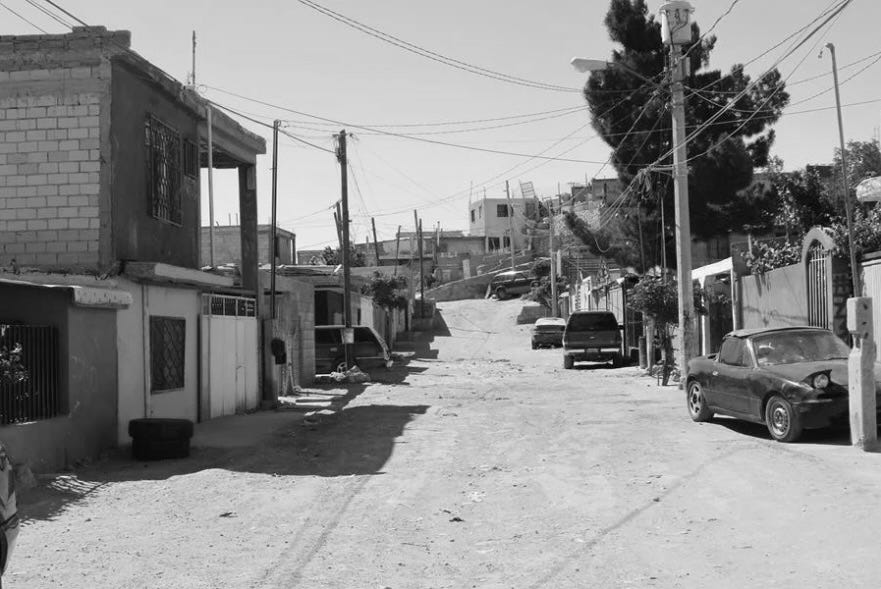I was 44, two years into my tenure as a school principal, having serious qualms about continuing, seeing how I was most likely halfway into my tenure as a human being, when one night an email comes across my computer telling me that Ernie Gonzales has died.
I lean back in my chair. On my desktop is some principal task that seemed urgent only a moment before, but now Ernie is gone, Ernie the first principal I ever worked for, Ernie with his 64 ounce trucker’s mug full of convenience store coffee and his crisp New Mexico accent.
And his guitar.
We are in his F150 pick-up truck barreling down I-25, somewhere south of Albuquerque. It is spring and the landscape is windswept, drought-dry. Tumbleweed territory. I have brought along my own guitar, and without taking his eyes off the highway or his hands off the wheel Ernie is talking me through the mechanics of playing “Cielito Lindo.” Four simple chords. Mile markers zip by, roadrunners doze.
I am 23 or 24, he is maybe 50. We have nothing but time.
Somewhere around Socorro I start to get the hang of it, how you don’t need to move every finger with every chord change, you see, you can keep the middle finger down on that fret on the A string, sort of an anchor, and let the other fingers re-organize around it. Start from the top, Ernie tells me, and we sing our way through the desert, past the turn off to the Trinity Test Site, where Oppenheimer & Crew placed bets on whether or not they’d ignite the atmosphere with their little contraption; past the Very Large Array, those enormous dishes perched in V formation, peering their noise collecting nozzles up toward the outermost reaches of space; past the green chile fields and pecan fields, oddly green among the dust.
At dusk I set the guitar down. In silence we cross the border into Juarez. Ernie winds the truck comfortably through the bars and clubs and brothels, their fluorescent lights flickering on for the evening, out past the factories and warehouses and into the ramshackle colonias with their narrow dirt roads where tin-topped cinderblock homes lean against each other like drunks on a park bench.
Night has fallen. There are no streetlights here. Ernie pulls up to one of these homes—how he can distinguish it from any of the others I can’t say—and cuts the engine. We get out of the truck and I follow him inside. When my eyes adjust to the yellow light of a single bulb hanging from the ceiling I see two small women working foot-operated Singer sewing machines. They greet Ernie quietly. One of them shuffles into a back room and returns with what we have come for, the holy grail of our Ford truck pilgrimage: A kid-sized mariachi outfit, emerald green, glistening with sequins and silver buttons. Handsewn.
One of them shuffles into a back room and returns with what we have come for, the holy grail of our Ford truck pilgrimage: A kid-sized mariachi outfit, emerald green, glistening with sequins and silver buttons. Handsewn.
Ernie holds it up, admiringly, then produces from his pocket a stack of American dollars, which he hands to the seamstress. She does not count it but clutches the cash in both hands as she thanks Ernie, smiling broadly, her uneven teeth. We climb back in the truck, stop on the strip for beer and fish tacos, and then drive the five hours back to Santa Fe under a night sky crowded with stars, alternating at the wheel, each of us pretending we are not nodding off when it is our turn. It is close to 2 AM when we get home, 14 hours since the previous day at noon when Ernie walked into my classroom not to give me advice on how to handle the 6th graders who were running me ragged, not to assign me lunch duty or remind me about a staff meeting, but to tell me to pack up my stuff, he’d found a sub to cover me, there was a mariachi concert tomorrow night, and the new guitar player, ten-year-old José, was not going be able to perform unless we got him his mariachi outfit, which was waiting to be picked up in Juarez.
I looked down at my lesson plans. “We’re going to Juarez? Now?”
He nods.
“Can I run home and get my guitar?”
“Hurry up,” he said, and now it is twenty years later, I shut my laptop and push away from my desk. When I find my guitar, dusty and out of tune, “Cielito Lindo” is the only song I can remember. Some things you never forget.





Seth, love everything about this story. And it takes me way back to learning guitar at home as a little girl with Dr. Padron, leathery skin, Cuban cigar in his mouth, classical guitar virtuoso. Pressing the flat of one or two of my middle fingers, picking and strumming, trying to sing the high notes of La Virgen de la Macarena. Most of the time I sat back mesmerized by Dr. Padron’s playing. (Needless to say, guitar did not last for me—but my love of those sounds remain.)
After reading this sentence, "Ernie winds the truck comfortably through the bars and clubs and brothels, their fluorescent lights flickering on for the evening, out past the factories and warehouses and into the ramshackle colonias with their narrow dirt roads where tin-topped cinderblock homes lean against each other like drunks on a park bench" - I thought, damn! This is excellent writing! Like, get this guy a literary agent!